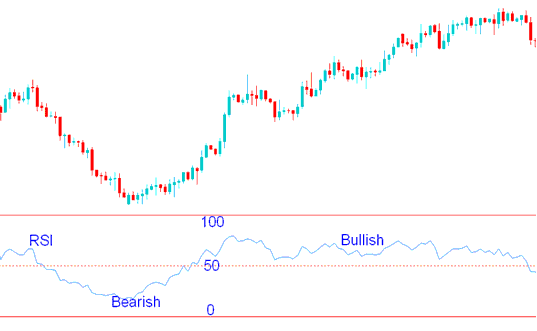RSI Indices Strategies
- RSI Overbought and Oversold Levels
- RSI Divergence Setups
- RSI Classic Bullish & Bearish Divergence
- RSI Hidden Bullish & Bearish Divergence
- Swing Failure Method
- RSI Stock Index Chart Patterns Trend Lines
- RSI Summary
RSI Indicator Stock Indices Strategy
RSI or RSI is one of the most popular indicator used in stock index trading. It is an oscillator indicator which oscillates between 0 -100. This a trend following indicator. It indicates the strength of the trend, values above 50 indicate a bullish stock trend while values below 50 indicate bearish trend.
RSI Indicator Measures Momentum of a Trend.
The center-line for the RSI is 50 stock indicator, cross-over of the center-line indicate shifts from bullish to bearish trend & vice versa.
Above 50, the buyers have greater momentum than the sellers and price on the stock chart will keep going up as long as this RSI indicator stays above 50.
Below 50, the sellers have greater momentum than the buyers and price on the stock chart will keep going downwards as long as RSI indicator stays below 50.

RSI Stock Index Indicator - How to Trade Stock Indices with RSI Technical Indicator
In the example above, when the indicator is below 50, the stock price kept moving in a downward trend. The stock price continues to move down as long as RSI indicator was below 50. When the RSI indicator moved above 50 it showed that the momentum had changed from sell to buy and that the downward stock trend had ended.
When the RSI indicator moved to above 50 the stock price started to move upwards and the trend changed from bearish to bullish. The chart price continued to move upwards and the RSI indicator remained above 50 afterwards.
From the example above, when the trend was bullish sometimes the RSI would turn downwards but it would not go below 50, this shows that these temporary moves are just retracements because during all these time the stock price trend was generally upwards. As long as RSI indicator does not move to below 50 the current trend remains intact. This is the reason the 50 center line mark is used to demarcate the signal between bullish and bearish trading signals.
The RSI indicator uses 14 day period as default period, this is the period recommended by J Welles Wilders when he introduced it. Other oftenly used periods used by Stock traders are the 9 & 25 day moving average.
The RSI indicator period used depends on the stock chart time frame you are using to trade, if you are using day chart time-frame the 14 period will represent 14 days, while if you use 1 hour chart time-frame the 14 period will represent 14 hours. For our example we shall use 14 day moving average, but for your trading you can substitute the day period with the chart time frame you are stock indices with.
To Calculate RSI Indicator:
- The number of days that a market is up is compared to the number of days that the market is down in a given time period.
- The numerator in the basic formula is an average of all the stock indices sessions that finished with an upward price change.
- The denominator is an average of all the down stock indices sessions closes for that period.
- The average for the down days are calculated as absolute numbers.
- The Initial RSI is then turned into an oscillator.
Sometimes very large up or down movement in stock price in a single stock indices session stock price period may skew the calculation of the RSI average and produce a false signal - whipsaw signal - in the form of a spike.
RSI Center line: The center-line for this indicator is 50. A value above 50 implies that the market trend is in a bullish phase as average gains are greater than average losses. Values below 50 indicate a bearish phase in the market stock prices are generally closing lower than where they opened.
Overbought and Oversold Levels: Wilder set the RSI overbought and oversold levels at which the market moves are overextended at 70 and 30.


